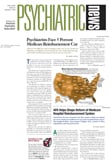The federal agency that administers the Medicare and Medicaid programs has announced that it will continue to allow psychiatrists and other clinicians to use the criteria in DSM-IV to determine the appropriate codes for mental health care services they provide to the programs’ beneficiaries.
The Centers for Medicare and Medicaid Services (CMS) announced in September that after a review, spurred in large part by concerns voiced by APA, it has decided to make no changes in the system whereby the DSM diagnostic criteria and descriptors can be used to assign the service codes found in the International Classification of Diseases, Ninth Revision-Clinical Modification (ICD-9-CM).
“The decision to continue use of the DSM system ensures the integrity of a classification system that has achieved acceptance everywhere in the country,” said Chester Schmidt, M.D., chair of the APA Committee on RBRVS, Codes, and Reimbursement. “A change to ICD-9 would have caused mass confusion and been very costly.”
Since 1980, when APA published DSM-III, the federal government has allowed clinicians to use the diagnostic manual to “cross-walk” to the ICD system, which has been the only coding system it allows for Medicare services and reimbursement for those services.
In a letter to APA members, APA President Marcia Goin, M.D., and Medical Director James H. Scully Jr., M.D., wrote, “In sustaining the agreement and practice, CMS averted the prospect of substantial disruption across the mental health field.”
In addition, they pointed out, “Because the ICD-9-CM Glossary of Mental Disorders uses DSM-II definitions, exclusive, mandated reliance on the ICD system would have severely undermined nearly a quarter century of advances in refining the classification system” used to diagnose mental disorders. (DSM-II was first published in 1968 and was in use until DSM-III was issued in 1980.)
The glossary of ICD-9-CM includes definitions of mental disorders based on the earlier DSM edition, and APA was concerned that CMS would mandate that physicians use those definitions instead of giving clinicians the option of continuing to reference the latest edition of DSM.
CMS took the matter under review because the coding system and criteria to support it are part of the Health Insurance Portability and Accountability Act (HIPAA), which went into effect last month. Last year APA began hearing from concerned psychiatrists, insurance companies, and state government officials troubled by the prospect that CMS was planning to make ICD the only diagnostic code set it would accept for reimbursement claims, explained Darrel Regier, M.D., director of the APA Office of Research and the American Psychiatric Institute for Research and Education. To make sure nothing came of that plan, APA testified twice in spring 2002 before the National Committee on Vital and Health Statistics about the critical nature of continuing to allow providers to use DSM criteria to support coding decisions. APA also raised the issue with Health and Human Services Secretary Tommy Thompson, emphasizing that DSM is designated in more than 600 state and federal laws and regulations as the source of criteria for determining eligibility for a host of benefit programs, such as those that assess mental disability, Regier told Psychiatric News.
CMS affirmed in September that the diagnostic criteria physicians use to code services are “outside the scope of HIPAA,” as long as physicians use those criteria to explain the ICD codes they selected for a particular patient service. This leaves DSM as an option for assessing coding criteria.
